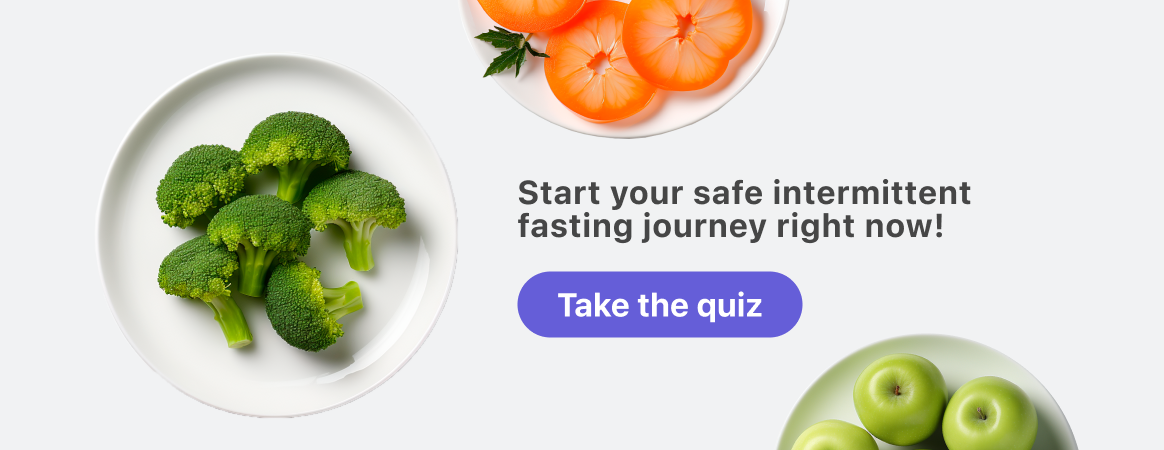Does fasting make you cold? –– learn the reasons with Simple

When embracing a new lifestyle like intermittent fasting, you may notice some changes in the way you feel. Some good (hello, sleeping better and better blood pressure), some bad (dizziness, headaches, etc.), and some weird or unexpected –– like feeling cold –– wait, does fasting make you cold?

Yes! Fasting can make you feel cold, but before we get into that, let’s make sure it’s safe for you to be here and that the weird stuff you may be experiencing isn’t likely a sign of something more serious. We don’t recommend fasting for anyone who:
- is pregnant, breastfeeding, or trying to conceive
- has type 1 diabetes
- is on prescription medications
- is under the age of 18 or 80 years or older
- is extremely active
- has a body mass index (BMI) < 18.5
- has an eating disorder or a history of one (or is at risk of developing one)
If this is you, we recommend you skip fasting and check in with your doctor for ways to reach your wellness goals that may be safer for you.
If you don’t fit into any of those categories, in our opinion, the best way to be prepared for all that is intermittent fasting –– the good, the bad, and the unexpected — is to start with our Simple quiz for a personalized guide through all of our tips, tools, and resources (after checking with your doctor, of course). We have answers to all of your questions, from the out-of-the-box ones, like “Should I be intermittent fasting by body type?” to the more clinical ones, like “How does intermittent fasting affect autophagy?” Now, back to feeling cold when fasting. Let’s talk about it!
Is feeling cold while fasting normal?
Of all the things you may have expected when you first started, feeling cold while fasting is probably not one of them. But you’re not imagining things; it can be a real and normal response to the changes going on in your body.
Why do I get cold when I don’t eat?

When you don’t eat for an extended period of time, the body has to get creative to find and preserve energy to keep things going. There are a few reasons why you may feel chills while fasting.[1]
- Thermogenesis: This is defined as the production of heat by the metabolism of a meal. In other words, when you eat and digest food, you produce heat while the body breaks the food down. You may feel cold when fasting because your body may lower its metabolic rate to conserve energy.[1]
You may be wondering, “Does intermittent fasting slow your metabolism?” It may sound like it with your digestive system in chill mode, but it’s been shown to help maintain your metabolism better than traditional calorie restriction.[2]
- Low blood sugar: Your blood sugar levels can drop when you fast.[3] As a result, you may feel a change in body temperature. This is more common in more restrictive types of fasting, like 5:2 (which we don’t recommend compared to less restrictive methods like TRE).
- Vitamin and mineral deficiencies: Some minerals like zinc,[4] magnesium, selenium,[5] and thiamine [6] help with temperature regulation. Knowing what to eat during intermittent fasting is important, so you can be sure to include a variety of foods during your eating window to minimize deficiencies. It’s also a good idea to discuss with your doctor whether you need a multivitamin or other supplements.
Tips on keeping comfortable and warm when fasting
- Adequate hydration is important for regulating your body temperature. Staying hydrated by knowing what you can drink while fasting can help prevent feeling cold during fasting.
- There is some thought behind combining intermittent fasting and keto to help the fat adaptation process (using fat for energy instead of carbohydrates) move along faster. The more your body adapts to burning fat, the less likely you are to feel cold while fasting.
- Exercise can certainly warm you up. However, be sure to safely combine intermittent fasting and working out to avoid any unwanted side effects.
- If something doesn’t feel right, or you have concerns, stop fasting and speak with your healthcare provider, who will be best positioned to help you.

- Patterson RE, Laughlin GA, LaCroix AZ, Hartman SJ, Natarajan L, Senger CM, et al. Intermittent fasting and human metabolic health. J Acad Nutr Diet. 2015 Aug;115(8):1203–12.
- Cho Y, Hong N, Kim KW, Cho SJ, Lee M, Lee YH, et al. The effectiveness of intermittent fasting to reduce body mass index and glucose metabolism: A systematic review and meta-analysis. J Clin Med Res. 2019 Oct 9;8(10).
- Grajower MM, Horne BD. Clinical management of intermittent fasting in patients with diabetes mellitus. Nutrients. 2019 Apr 18;11(4).
- Institute of Medicine (US) Committee on Military Nutrition Research, Marriott BM, Carlson SJ. Micronutrient deficiency states and thermoregulation in the cold. National Academies Press (US); 1996.
- Toh P, Nicholson JL, Vetter AM, Berry MJ, Torres DJ. Selenium in bodily homeostasis: Hypothalamus, hormones, and highways of communication. Int J Mol Sci. 2022 Dec 6;23(23).
- Mrowicka M, Mrowicki J, Dragan G, Majsterek I. The importance of thiamine (vitamin B1) in humans. Biosci Rep. 2023 Oct 31;43(10).
